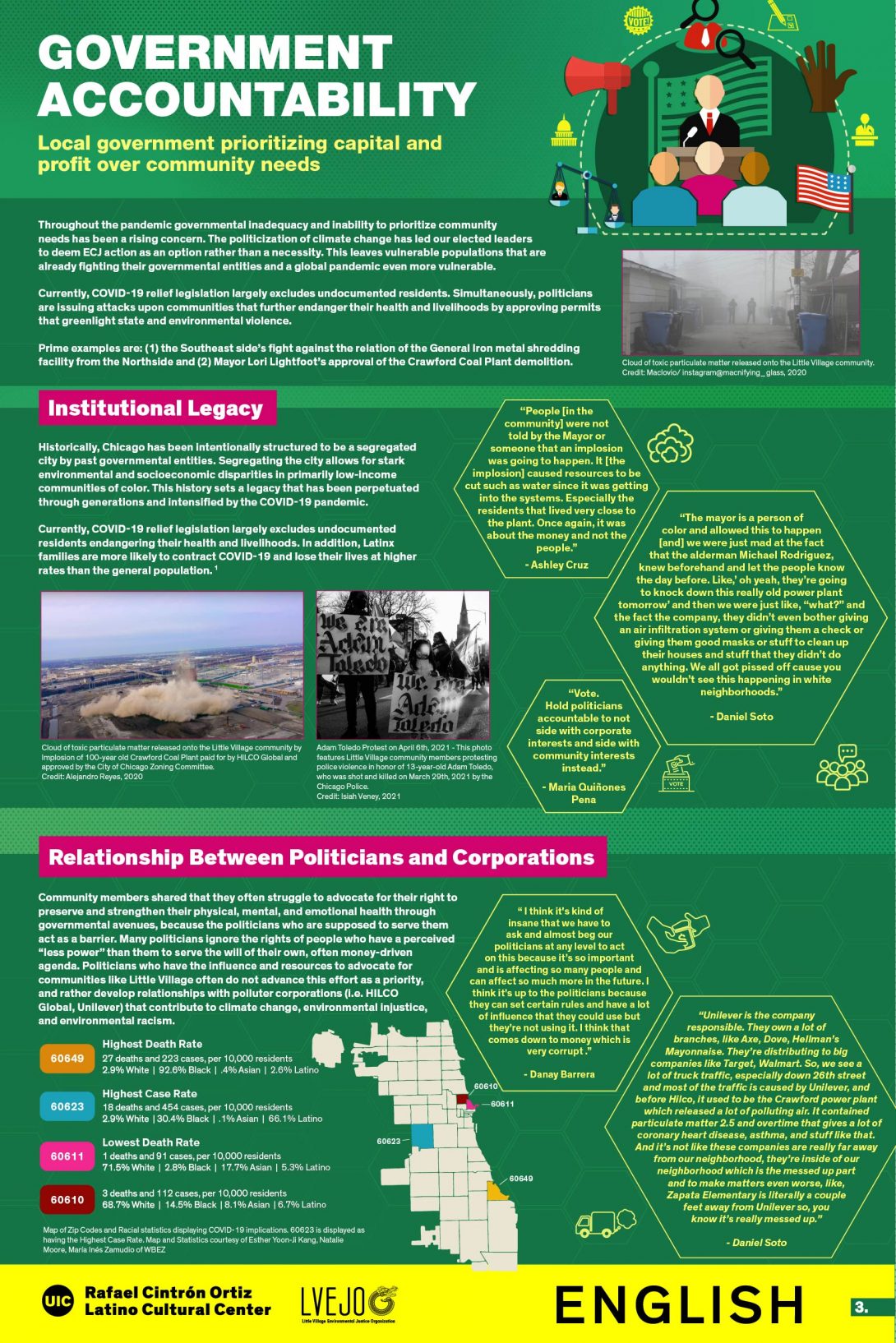Government Accountability
Local government prioritizing capital and profit over community needs
Government Accountability

Throughout the pandemic governmental inadequacy and inability to prioritize community needs has been a rising concern. The politicization of climate change has led our elected leaders to deem ECJ action as an option rather than a necessity. This leaves vulnerable populations that are already fighting their governmental entities and a global pandemic even more vulnerable. Currently, COVID-19 relief legislation largely excludes undocumented residents. Simultaneously, politicians are issuing attacks upon communities that further endanger their health and livelihoods by approving permits that greenlight state and environmental violence. Prime examples are: (1) the Southeast side’s fight against the relation of the General Iron metal shredding facility from the Northside and (2) Mayor Lori Lightfoot’s approval of the Crawford Coal Plant demolition.
Institutional Legacy
Historically, Chicago has been intentionally structured to be a segregated city by past governmental entities. Segregating the city allows for stark environmental and socioeconomic disparities in primarily low-income communities of color. This history sets a legacy that has been perpetuated through generations and intensified by the COVID-19 pandemic.
Currently, COVID-19 relief legislation largely excludes undocumented residents endangering their health and livelihoods. In addition, Latinx families are more likely to contract COVID-19 and lose their lives at higher rates than the general population.
“People [in the community] were not told by the Mayor or someone that an implosion was going to happen. It [the implosion] caused resources to be cut such as water since it was getting into the systems. Especially the residents that lived very close to the plant. Once again, it was about the money and not the people.” – Ashley Cruz
“The mayor is a person of color and allowed this to happen [and] we were just mad at the fact that the alderman Michael Rodriguez, knew beforehand and let the people know the day before. Like,’ oh yeah, they’re going to knock down this really old power plant tomorrow’ and then we were just like, “what?” and the fact the company, they didn’t even bother giving an air infiltration system or giving them a check or giving them good masks or stuff to clean up their houses and stuff that they didn’t do anything. We all got pissed off cause you wouldn’t see this happening in white neighborhoods.” – Daniel Soto
“Vote. Hold politicians accountable to not side with corporate interests and side with community interests instead.” – Maria Quiñones Pena
Relationship Between Politicians and Corporations
Community members shared that they often struggle to advocate for their right to preserve and strengthen their physical, mental, and emotional health through governmental avenues, because the politicians who are supposed to serve them act as a barrier. Many politicians ignore the rights of people who have a perceived “less power” than them to serve the will of their own, often money-driven agenda. Politicians who have the influence and resources to advocate for communities like Little Village often do not advance this effort as a priority, and rather develop relationships with polluter corporations (i.e. HILCO Global, Unilever) that contribute to climate change, environmental injustice, and environmental racism.
Highest Death Rate:
Zip code 60649: 27 deaths and 223 cases, per 10,000 residents 2.9% White | 92.6% Black | .4% Asian | 2.6% Latino
Highest Case Rate:
Zip Code 60623: 18 deaths and 454 cases, per 10,000 residents 2.9% White | 30.4% Black | .1% Asian | 66.1% Latino
Lowest Death Rate:
Zip Code 60611: 1 deaths and 91 cases, per 10,000 residents 71.5% White | 2.8% Black | 17.7% Asian | 5.3% Latino
Zip Code 60610: 3 deaths and 112 cases, per 10,000 residents 68.7% White | 14.5% Black | 8.1% Asian | 6.7% Latino
“I think it’s kind of insane that we have to ask and almost beg our politicians at any level to act on this because it’s so important and is affecting so many people and can affect so much more in the future. I think it’s up to the politicians because they can set certain rules and have a lot of influence that they could use but they’re not using it. I think that comes down to money which is very corrupt .” – Danay Barrera
“Unilever is the company responsible. They own a lot of branches, like Axe, Dove, Hellman’s Mayonnaise. They’re distributing to big companies like Target, Walmart. So, we see a lot of truck traffic, especially down 26th street and most of the traffic is caused by Unilever, and before Hilco, it used to be the Crawford power plant which released a lot of polluting air. It contained particulate matter 2.5 and overtime that gives a lot of coronary heart disease, asthma, and stuff like that. And it’s not like these companies are really far away from our neighborhood, they’re inside of our neighborhood which is the messed up part and to make matters even worse, like, Zapata Elementary is literally a couple feet away from Unilever so, you know it’s really messed up.” – Daniel Soto